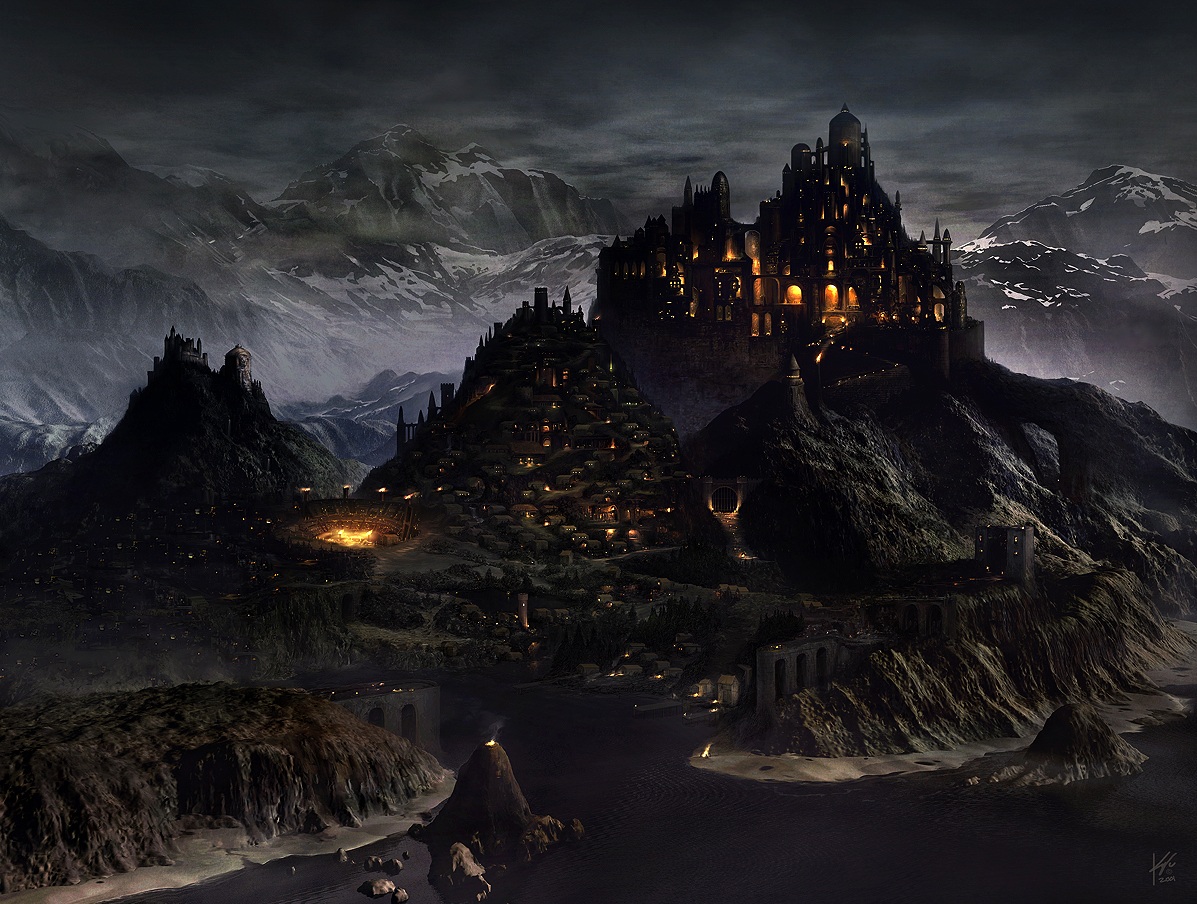Yauk and Jethras spent a few weeks renovating a crumbling tower that they purchased from a crooked merchant named Dobbas. Dobbas had hired them to retrieve a statue that had been stolen from him by another shady merchant / sorcerer. The players were able to retrieve that statue, but they were forced to kill the merchant, as well as the two demons that he summoned to hinder them.
While the PCs were renovating their new abode, a letter arrived from a merchant residing in a wealthy hilltop district. The merchant, Sepharis Vulnoor, invited the PCs to dinner at his manse to discuss a business proposition. The PCs, low on on coin from carousing and renovations, were happy to take the merchant up on his offer.
To make a long story short, Sepharis informed them that he was in the process of selling some old granary warehouses located near the wharves, but that he feared that one of the many local crime syndicates would attempt to raze the buildings to prevent the sale. He implied that commerce inevitably forced one to transact with all sorts of individuals, associations, both legitimate and illegitimate, and that one was bound to make enemies.
So, upon agreeing on an initial sum, the PCs were asked to patrol three warehouses that were on the verge of being sold. The PCs took their leave of the merchant and headed directly to the wharves. On the way, they were waylaid by a group of rather forceful beggars. Jethras's cloak was fouled by one of the beggar's dung after he drew his demon-infested sword and threatened to murder them. A chase ensued through tangled and twisted alleys, but the PCs ended up abandoning the chase; Jethras discarded his cloak and importuned Sepharis to have his personal tailor fashion him a new one, the following day.
Two of the warehouse buildings were empty. However, the PCs encountered a grisly site when they entered the third warehouse. Several individuals - thieves, by the looks of them - lay dead at that back of the alley. It appeared as though they had been hacked to death, or torn apart by something hideously strong. More terrifying still, it appeared as though parts of their bodies had been eaten.
Upon recovering from the grisly site, the PCs also noticed that makeshift bed had been fashioned in the corner of the building. Jethras and Yauk deduced that the rogues had encountered whatever it was that had taken up residence in the building, and that it had proven to be a tougher foe than they bargained for. It was unclear, however, what the thieves were doing in the building. Were they, as the merchant suspected, there to burn the buildings?
Upon asking some of the local denizens if they'd spied anything untoward, they learned that an odd fellow was seen coming and going from the building. He was a bald man of indeterminate age, who seemed to be heavily scarred. Jethras and Yauk decided it would be prudent to bring this information to the attention of the merchant Sepharis.
Although Sepharis was not particularly pleased that he'd been roused from his slumber, his anger was morphed into fear when PCs recounted what they'd witnessed at his warehouse. Sepharis asked the PCs to keep the matter to themselves, and offered to pay them additional money if they disposed of the dead bodies and, in his words, brought the matter to a close without involving the city garrison. The merchant was obviously concerned about the events coming to light and ruining the sale of his warehouses.
Although the PCs were convinced that the merchant knew far more than he'd divulged, they agreed to his terms and departed from his manse and decided to return to the warehouse and wait for the oddly-scarred man to return. They hid behind some old boxes, and, as fate would have it, four men attired in similar fashion to those that had been slain entered the warehouse.
The PCs managed to get the drop on the strangers, who imprudently decided to fight and were all but slain by the Jethras and Yauk. One of the thieves surrendered and, under threat of torture, admitted that they were in fact in pursuit of an individual named Jaliel, a bald freelance thief who had incurred the wrath of the syndicate to which those rogues belonged: The Pilferers' Union.
The PCs also learned that the thieves knew nothing about the sale of the warehouse, nor did they have any quarrel with Sepharis Vulnoor. The PCs allowed the fledgeling thief to leave, and they went about cleaning up the mess that they and whomever else had made in the warehouse.
They decided then to retire to their tower for some well-earned sleep. The following day, they decided to visit the merchant Dobbas at his favorite haunt, The Frigid Moon, a seedy tavern in the narrows. Dobbas admitted to them that he was actually not a merchant, per se, but a well-known fence who liquidated ill-gotten loot for just about every syndicate within Hrulvir. He offered his services to the PCs at what he swore was an affordable rate, and then proceeded to offer them both his favorite wine.
They asked Dobbas if he could extend his antennae and find out who Jaliel was, and where they might be able to find him. Dobbas told them to come back in a few hours. When the PCs returned, Dobbas told them that Jaliel was known to frequent the sewers of Undercity, and that he'd made quite a few enemies in Hrulvir's underworld. Thievery and skullduggery was rampant in The City of the Groaning Gates, but none of its instigators tolerated or respected unaffiliated thieves.
The PCs entered the sewers, and, after sloshing through muck and mire of the foulest sort, discovered another makeshift bed nestled away in a tiny cavern that branched off from the main sewer way. A few moments later, they heard the sound of coarse voices. The two PCs hid in time to evade a powerful-looking man attired in black, serpentine leather, as well as three rogues.
The PCs rather brazenly decided to make their presence known and they confronted the men. Their leader told them that his name was Grimnick, and that he and his men were there to take care of Jaliel. He informed them that the apprentice thief that they'd freed told him everything, after being tortured, and he accused the PCs of murdering all the thieves in the warehouse! Despite the PCs' best efforts to avoid a fight, the ensuing melee cost the lives of two of the lackeys and mortally wounded Grimnick. The third toady managed to escape without a scratch.
Jethras and Yauk preformed triage upon Grimnick and decided to drag him back to their nearby tower. They were stopped by a contingent of Ravens - the city garrison - and they were forced to pay a hefty bribe for carrying weapons, as well as conveying a wounded individual between them.
Upon returning to their tower, Jethras remained with the wounded rogue and Yauk ventured out into the city and fetched the lovely Frost, an enigmatic sorceress and scholar whom the PCs befriended in an earlier episode. Although she was not very enthusiastic about becoming embroiled within her acquaintances' affairs, Frost was willing to aid a wounded individual.
She partially healed Grimnick and unceremoniously took her leave. The PCs interrogated Grimnick about his affiliation with The Pilferers' Union. They learned that the Union was headed by a mysterious trio of conjoined twins known as The Dark Ladies. Despite their best efforts, the PCs were unable to convince Grimnick to help facilitate a meeting with these enigmatic twins. They finally decided to let Grimnick go, but not before they stripped him of his armor and his weapons.
Yauk decided to wear the armor, and, as soon as he buckled it to his powerful frame, he was forced to engage in a battle of will with the demon that had been bound to it. Fortunately, the Organ warrior succeeded in subjugating the otherworldly being and learned that its true name was A'zzz'zz'le.
The PCs, still empty-handed, decided to venture forth into the night once again. They had not ventured but a few blocks from their tower when Yauk spied a bald, compact fellow with a scarred face lurking in the shadows of a side alley. Jaliel, at last!
He beckoned them into the alley and the PCs and he engaged in a long chat. They were still relatively certain that he was responsible for the grisly deaths of the thieves, so they remained wary of the surprisingly gregarious thief. Jaliel assured them that he was not responsible for anyone's death whatsoever. He then proceeded to tear a tattered tunic from his upper body and reveal a torso that was completely covered in strange glyphs and sigils. Every inch of his face was covered as well. He raised his leggings and revealed that the flesh on his thighs and calves was also covered. Every inch of his body, in fact, had been scarred with a spidery script.
He informed the PCs that he had once been enslaved by a sorcerer from the Crimson Isle named Arvic Crool, and that the sorcerer had used Jaliel's body as his grimoire. He'd escape before Crool could flay him alive and bind his flesh within the covers of a massive tome. He's spent his life since then hiding from Crool's agents. This Arvic Crool was the very same Crimson Islander who was rumored to have sailed to mainland and was currently amassing an army in the East. Jaliel said that this profane warrior was known to wear the flesh of a murdered child across half his face, that his lips had been removed, along with a portion of skull.
It was at that moment that a massive form entered the alley. The thing that entered was close to seven feet tall, and carried an axe made of bone. He wore a thick cloak that appeared as though it had been fashioned from human flesh. This, it seemed, had been the thing that had made short work of the thieves. He raised it's left hand and tossed the head of Grimnick at the feet of the PCs. A terrible battle ensued.
The PCs were both wounded, as was Jaliel, who was nearly disemboweled by the giant. They managed to fell the thing and dragged Jaliel off to their tower, along with the axe, a dagger carven from bone, and the cloak. Finis.
 One of the things that I've noticed thus far is that BRP does not necessarily emulate the cinematic feel of the typical sword and sorcery yarn without some tweaking. I am currently using the Elric! rulebook, as well as the big gold BRP rulebook. If you'll permit a bit of a digression, the latter is one of the most valuable rpg books that I've ever purchased. Not only does it succinctly present Chaosium's house system, it presents pages of optional rules that can seamlessly integrated.
One of the things that I've noticed thus far is that BRP does not necessarily emulate the cinematic feel of the typical sword and sorcery yarn without some tweaking. I am currently using the Elric! rulebook, as well as the big gold BRP rulebook. If you'll permit a bit of a digression, the latter is one of the most valuable rpg books that I've ever purchased. Not only does it succinctly present Chaosium's house system, it presents pages of optional rules that can seamlessly integrated.








